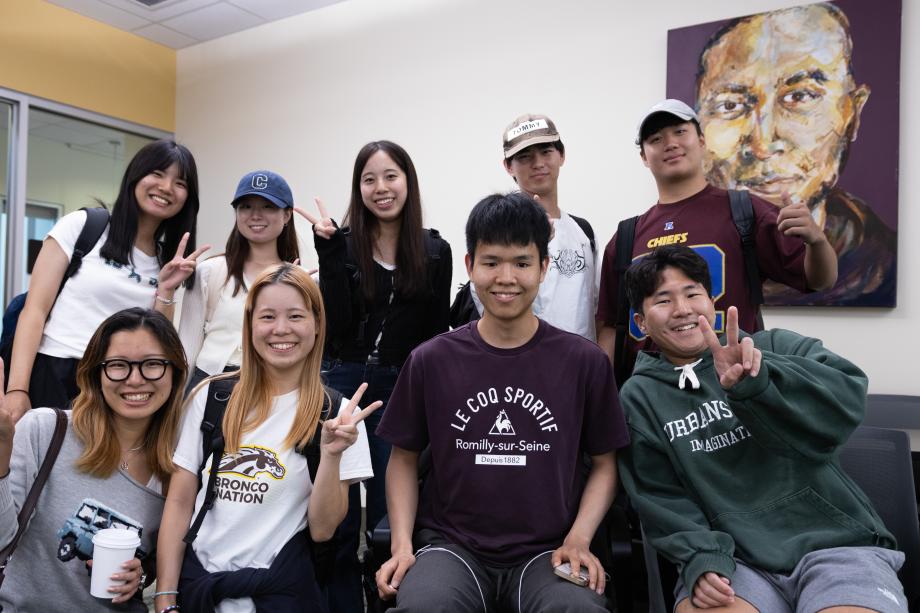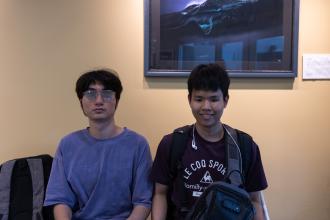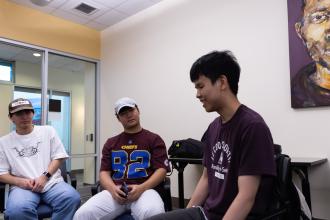Breaking Barriers: Blind international students find opportunity at WMU
KALAMAZOO, Mich. — International student Yusung Chae plans to spend only one semester at Western Michigan University, but he says the experience will be life-changing.
Chae, 21, is pursuing an economics degree at Yonsei University in South Korea and hopes to work in finance in the United States. He is also blind.
He came to Western as an independent traveler on a scholarship from the Chung In wook Foundation, a South Korean organization that promotes equitable access to education and the arts. The foundation seeks to reduce disparity and champion the growth of promising young individuals.
“The finance field requires fluent English skills, so that’s why I came here,” Chae says. “When I entered university, my goal was to challenge myself. I realized that the real obstacle in my life is not only the environment surrounding me, but also myself.”
A Partnership Built on Inclusion
For more than two decades, WMU’s Center for English Language and Culture for International Students (CELCIS) has welcomed visually impaired South Korean students.
Discussions about the program began in 2011 after a delegation from South Korea visited Western’s Department of Blindness and Low Vision Studies, says Professor and Chair Emeritus Jim Leja.
The Chung In wook Foundation had been sending talented blind undergraduate students to an English language program at a university in Oregon but was dissatisfied with the quality and accessibility of English instruction, campus orientation and mobility support.
“With the help of CELCIS, we created a program to address the needs of these scholarship students,” Leja says. “The program was successful for everyone involved.
“Students from South Korea received excellent English language training, and practicum students from the Blindness and Low Vision Studies program provided orientation and mobility instruction while also learning about blindness in another culture.
“CELCIS faculty also became skilled at working with students who were blind. The program continues to this day.”
Finding Confidence and Community
Chae shares his story in the lobby of Lee Honors College during a Conversation Circle, a weekly event organized by CELCIS for international students to practice English and make friends.
He wears large headphones and translates from Korean to English using AI tools on his phone and laptop. He types on a braille keyboard. A mix of Hangul and Latin letters appear on a screen he cannot see.
Chae went blind at age 13 and still remembers the third-grade illness that began his vision loss. By middle school, he was learning braille and mobility skills.
In high school, he worried about his future but refused to give up on his dreams.“I knew if I hesitated, I’d end up not trying," he says.
Weeks after arriving in Kalamazoo, Chae joined the Data Science Club. In addition to intensive English coursework, he enjoys American food and the open spaces of WMU’s campus. The streets of Seoul are crowded, he says.
“I try everything now, and sometimes I fail, and that’s okay," Chae says. "I learn from it, and I keep growing up."
CELCIS at 50: A Global Gateway
Students come to CELCIS from all over the world to learn English, says Chair Eva Copija. Through short- and long-term programs, students advance their careers and achieve English proficiency levels that allow admission to universities in the United States and other English-speaking countries. The Center is celebrating its 50th anniversary this year.
"CELCIS' true strength remains not just in teaching a language, but in our enduring commitment to fostering cross-cultural understanding and equipping our students with the essential life and academic skills they need to succeed in a global community,” Copija says.
At the Conversation Circle last month, Gimyung Kim, 21, laughed with his peers. The room was filled with students, both domestic and international, discussing pop culture and social media across cultures.
Kim attends Soongsil University in South Korea. He also came to WMU with a Chung in wook Foundation scholarship.
“Western is helping me with better communication,” says Kim, a business major who hopes to work in international sales.
“There are a lot of people from diverse countries at Western, and I’m learning to ask questions from people from all over the world,” he says.
Kim lost his sight at age 3 due to childhood cancer. He was living in a dormitory in South Korea last year when he learned about the opportunity to come to Western.
He had been seeking a challenge and wanted to improve his English. One of his favorite activities in South Korea was speaking with foreigners, especially English speakers.
“It was not really hard for me to decide to come here,” he says.
Kim enjoys the accessibility of WMU’s campus facilities, especially the recreation center. He likes making friends from all over the world and is impressed that students from 95 foreign countries attend WMU. He especially loves it when people approach him on campus and say hello.
“It’s really easy for me to communicate and I can do many things,” he says. “Just approach me comfortably—that is the most important.”
Donate and support the CELCIS scholarship fund.
About the Haenicke Institute for Global Education
The Diether H. Haenicke Institute for Global Education, established in 1998, fosters an environment that supports the global engagement of the Western community. Its offices assist nearly 2,000 international students and alumni at home and abroad with admissions, immigration, student success and post-graduation job training.
The institute also facilitates short- and long-term study abroad programs for students, faculty and staff. It hosts a variety of global learning activities, such as designing and promoting scholarship and academic opportunities on campus; providing K-12 outreach; hosting lectures, panels and events; and showcasing arts, entertainment and culture from around the world. Learn more about the Haenicke Institute for Global Education.
For more WMU news, arts and events, visit WMU News online.




